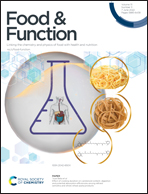Lactobacillus plantarum 23-1 improves intestinal inflammation and barrier function through the TLR4/NF-κB signaling pathway in obese mice†
Abstract
As a natural active ingredient, lactic acid bacteria have potential anti-inflammatory effects. In this study, male C57BL/6J mice were given a high-fat diet (HFD) to establish an obese mouse model. Lactobacillus plantarum 23-1 (LP23-1) with prebiotic characteristics was intervened for 8 weeks to evaluate its remission effect on obese animals and related mechanisms. The effects of LP23-1 on lipid accumulation and intestinal inflammation in HFD-fed mice were systematically evaluated by detecting lipid accumulation, blood lipid level, pathological changes in the liver and small intestine, oxidative stress and inflammatory cell level, lipid transport-related gene expression, the inflammatory signaling pathway, and intestinal tight junction (TJ) mRNA and protein expression. The results showed that LP23-1 could significantly reduce the body weight and fat index of HFD-fed mice, improve the lipid levels of serum and liver, reduce the histopathological damage to the liver and small intestine, and alleviate oxidative stress and inflammatory response caused by obesity. In addition, reverse transcription-polymerase chain reaction and western blot analysis showed that LP23-1 could regulate the mRNA expression of lipid transport-related genes; activate the TLR4/NF-κB signaling pathway; reduce intestinal inflammation; improve the mRNA and protein expression of intestinal TJ proteins zona occludens-1 (ZO-1), occludin, claudin-1, and Muc2; repair intestinal mucosal injury; and enhance intestinal barrier function. The aforementioned results showed that LP23-1 through the TLR4/NF-κB signaling pathway and intestinal barrier function reduced obesity symptoms. This study provided new insights into the mechanism of LP23-1 in reducing obesity and provided a theoretical basis for developing new functional foods.

- This article is part of the themed collection: Food & Function HOT Articles 2022


 Please wait while we load your content...
Please wait while we load your content...